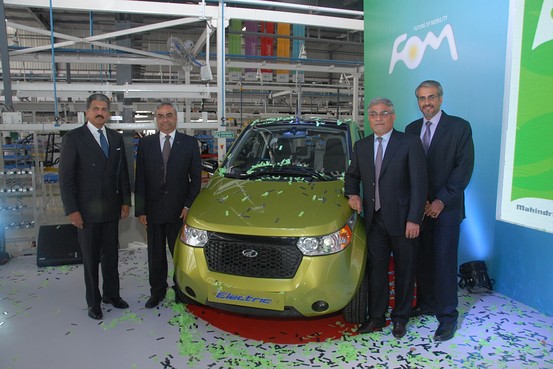India reveals plans for electric cars. It is developing quickly as a key automotive market, so it’s no surprise that India is also looking to lead the way with electric vehicles.
Addressing the 2nd International Green Manufacturing Summit here today, organized jointly by the Confederation of Indian Industry, OECD and BIAC, the Minister said the electrical mobility mission would provide incentives and subsidy to industry to focus on electrical mobility and encourage new technologies.
At present, Mahindra Reva is the only electric car maker in the Indian market which sells Reva I electric cars in both domestic and foreign markets.
Union Minister for Heavy Industries and Public Enterprises, Mr Praful Patel, today said that a mission to promote electric vehicles would be formally launched in a few months.
This was just one of the key initiatives being taken by the government to balance environmental concerns and sustained growth in the manufacturing sector.
Mr Patel was optimistic that India can become a manufacturing hub for the world given its strong technical and engineering foundation. “We have a very diverse manufacturing sector that engages in the entire spectrum of activities,” he said.
Mr Saurabh Chandra, Secretary, Department of Industrial Policy and Promotion, stressed on clean and green technologies and the incentives for sustainable practices in the National Manufacturing Policy. He informed that the contours of the Technology Acquisition and Development Fund (TADF) for the proposed National Investment and Manufacturing Zones (NMIZs). were being shaped and would be discussed at a stakeholder workshop on September 19.
The TADF, he said, would be used for reimbursement of royalties for patented technologies for MSMEs up to Rs 20 lakh. It is also likely to have 10% capital subsidy as an incentive for production of equipment or devices that control pollution, reduce energy consumption and conserve water.
NMIZs will be mega industrial zones with world class supporting infrastructure. The government is offering a host of incentives including liberalised labour and environment norms to promote these zones. The NMP proposes to create 100 million jobs by 2020, he said.
The provisions of NMP can be applied even to existing manufacturing industry establishments which organize themselves as clusters with regulatory mechanism as specified in the policy.
Mr Amitabh Kant, CEO & Managing Director, Delhi Mumbai Industrial Corridor Dvpt Corp Ltd, highlighted the need to use technology to leapfrog ahead and build smart cities to address the urbanization challenges being faced by the country. Stressing on the imperative for transit-oriented development, he highlighted the need for green technologies in the manufacturing process to catalyse sustainable growth.
Mr Kant said that for India to grow at the desired 8-9% per annum, the manufacturing sector would need to grow at 14-15% per annum on a sustained basis. Historically, he said, no country has grown on the back of agriculture and therefore it is imperative that we focus on sustainable manufacturing to enhance competitiveness and growth.
Mr K Venkataramanan, Chairman, CII Manufacturing Council and L&T CEO set the agenda for the deliberations by calling upon the manufacturing sector to continuously explore how they can integrate sustainable, green practices into their processes. He said this would also attract the best minds into manufacturing as opposed to software & IT sector currently.
Dr Arindam Bhattacharya, Vice Chairman, CII Manufacturing Council and Managing Director, Boston Consulting Group, said that ‘sustainability’ need not be a bad word for manufacturers as consumers are willing to pay a premium for ‘green’ products. Businesses worldwide too are increasingly making their sustainability efforts public with 95 per cent of Fortune 250 companies already doing some form of CSR reporting.
Earlier, welcoming the participants, CII Director General Chandrajit Banerjee said that a focus on manufacturing was integral to the inclusive growth agenda of the government. He said the CII had taken up green and sustainable issues and capacity building in the industry in a sustained and committed manner through its Centres of Excellence.
The CII Summit is being held with the objective to identify and share innovative solutions and key policy enablers that will facilitate the industry in developing technological capabilities, product and market from the perspective of green manufacturing in different sectors. The sessions focused on green products, green infrastructure including buildings, energy efficiency systems, green chemicals and enablers for green manufacturing.

